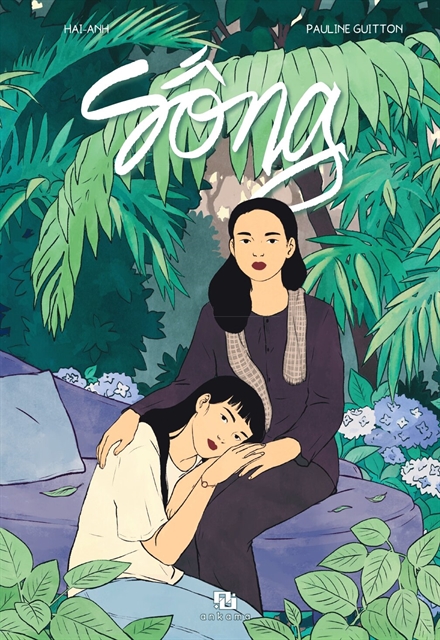 Inner Sanctum
Inner Sanctum

 |
| Trần Hải Anh (left) and Pauline Guitton, co-author of 'Sống' – Photo courtesy of Trần Hải Anh/Olivier Clertant |
Vietnamese-French author Trần Hải Anh, featured on Forbes Under 30 list, captivated readers with her debut book Sống (Live), a powerful graphic novel chronicling her mother's experiences in the Việt Nam War. Trương Khánh Linh dives deeper into her personal life and career
Inner Sanctum: Can you tell us about your background and upbringing as a Vietnamese woman raised in France?
I grew up in France in a family deeply connected to our Vietnamese roots. At home, my parents exclusively spoke Vietnamese, so starting kindergarten without knowing a word of French was a bit traumatising, yet it was a common experience for many second-generation immigrants. However, it only took a few weeks at school until I became more fluent in French than in Vietnamese.
Prior to moving to Hồ Chí Minh City, I had spent my entire life in Paris, yet I have always maintained a strong bond with Vietnamese culture. At home, we would watch Cải lương (Reformed theatre) and Paris by Night DVDs, and in the car, we would listen to Trịnh Công Sơn CDs.
Our lives were the celebrations of Tết (Lunar New Year festival), Vu lan (Parents' Day), summers in Việt Nam, and Tết Trung Thu (Mid-Autumn festival). One of my fondest childhood memories was the annual holiday camp I attended exclusively for Vietnamese-French teenagers. Connecting early on with other young overseas Vietnamese who shared similar experiences was truly transformative.
Inner Sanctum: How do you feel when your name appeared on the list of Forbes 30 Under 30 Asia?
Receiving the news came as a genuine surprise to me, since I knew very little about the Forbes Under 30 list and assumed it essentially focused on entrepreneurs. Little did I know that Forbes had a list dedicated to the entire Asian continent, celebrating 300 influential individuals across various fields. When I realised what it meant for Sống and the art of comics in Việt Nam, it was very touching. Moreover, being associated with Việt Nam instead of France truly warmed my heart.
Inner Sanctum: Can you give me a brief intro of 'Sống', and how you came up with the name of the book?
Sống tells the story of my mother, Việt Linh, a renowned Vietnamese filmmaker who, at the age of 16, courageously joined the resistance during the anti-American war in Việt Nam.
The book chronicles the daily experiences of this young teenager, her initiation into the resistance life, and her exploration of the art of cinema, while delving into the profound influence those years had on our mother-daughter relationship.
Even though the comic book [published by Ankama with dialogue written in French] was intended for a French audience, it was important for me to choose a Vietnamese title because it keeps me connected to my mom and my roots. Sống, which means to be alive, to live, came very naturally to me as I love the meaning and the sound of it. I wanted to move away from the notion of mere surviving and emphasise that her life was as fulfilling and rich as anyone else’s.
Inner Sanctum: What led you to write 'Sống'?
It was a blend of my love for my mother and a deep passion for comics that fuelled my desire to share her story. I would often hear her recount memories repeatedly at dinner parties, captivating the guests with her words. Although I was studying cinema at the time, the idea of making a film felt overwhelming, especially since war movies held little appeal to me.
The idea remained dormant until one day, when I read Art Spiegelman's Maus, and it struck me profoundly. The author's connection with his father resonated deeply within me. As soon as I finished the book, I reached out to Pauline [Guitton], my illustrator partner and best friend, to discuss the possibility of collaborating on a comic book project about my mother's incredible life. Pauline was immediately captivated by the idea, and then convincing my mother to embark on this journey which didn't take long. Looking back, it all makes perfect sense now.
 |
| The cover of comic book 'Sống' – Photo courtesy of Ankama Publishing |
Inner Sanctum: Why do you choose comics as a way to tell your story?
I find it amusing to be asked this question. If I had opted to write a film or a book without illustrations, I don't believe it would have come as a surprise to anyone. It highlights the unfortunate reality that the art of comics is not yet fully appreciated as it deserves. However, it further reaffirms my conviction that I made the right decision to write one.
As I mentioned earlier, both Pauline and I immediately envisioned Sống as a comic book, despite our backgrounds in the film industry. The simple truth is that we both have a deep love for reading comic books.
In this story, the concept of time and chronology becomes hazy within the daily life of the jungle, which led me to choose a thematic narrative rather than a strictly chronological one.
This approach aligns well with the form of a graphic novel. Besides that, we strongly believed that illustrations would convey a greater sense of tenderness and poetry, given how heavy the story is.
Inner Sanctum: How does this book distinguish itself from others on the subject of the anti-American war in Việt Nam?
There are still sadly few personal accounts of the anti-American war in Việt Nam from the Vietnamese perspective available in English and French. Consequently, each published book naturally stands out as a rare testament to this period of history. These stories shed light on how little is known about our country. Having read numerous books by the Vietnamese diaspora in the US and in France, I found them to be a great source of inspiration, as they gave me the courage to write.
It also made me realise that my mother's story was absent from the literary landscape. There had never been a narrative told from the viewpoint of a 16-year-old Vietnamese girl who joined the resistance and discovered the world of cinema during the Việt Nam War – an extraordinary and unheard-of perspective.
Inner Sanctum: How do you think your comic book resonates with both Vietnamese and French audiences?
Sống was published in January 2023 and is currently only available in French. Consequently, I have received feedback exclusively from French-speaking readers thus far. Some readers have picked up the book with the intention of delving deeper into this historical period, while others are drawn to Việt Nam, the dual cultural aspects, or the complexity of parent-child relationships.
Together with Pauline, we went on bookshop and book festivals tours across various cities since its release, and the experience of meeting (future) readers has been truly magical. Each person approaches Sống with a unique and personal motive, and it is incredibly touching to witness their individual connections to the book.
Inner Sanctum: During the process of working on this story, were there any interesting stories that you want to share?
What made the writing process fascinating was that I conducted the interviews along the way, which meant I had no predetermined path or knowledge of where the story was heading, including its ending. I had little understanding of the depth of my mother's experiences until I embarked on this journey.
I certainly did not anticipate that I would move to Việt Nam in the midst of a global pandemic in 2020. Without revealing too much, all of this made the writing process very uncertain. As someone who typically enjoys planning and knowing what comes next, allowing myself to be carried along without a clear destination allowed me to delve deeper into the story and appreciate the lengthy writing process. VNS




